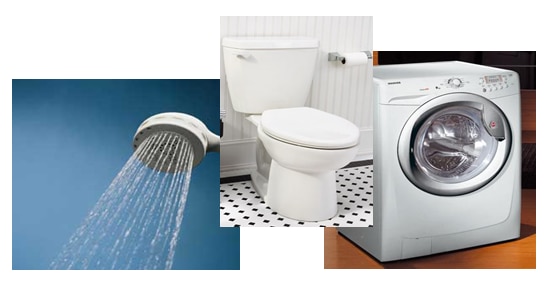Project Description
Location: Reading, MA
Purpose:
- Demonstrate two municipal water conservation incentive programs, designed to reduce indoor water use among town residents.
- Measure the water savings for households participating in the incentive programs and the reduction in overall water demand on the Reading public water supply as a result of these programs.
Details: In 2003, the town of Reading implemented a comprehensive water conservation program, which includes rebates, residential water audits, retrofits of municipal buildings with water-saving devices, an audit of the town’s water distribution system, leak detection and repair, and an extensive public education program. The town provided data to the Targeted Watershed project on two of its residential water-conservation incentive programs. These programs provide:
- Rebates for low-flow toilets (up to $120), high-efficiency washing machines (up to $200), and rain-sensor systems ($25)
- Water audits and free installation of water-saving devices tailored to the customers’ needs, including low-flow showerheads, faucet aerators, and toilet tank volume displacement bags
The town expanded its program to offer rebates for rain barrels ($25, starting in 2006) and audits to improve the efficiency of irrigation systems (starting in 2007). However, at the time of data analysis, these features of the program lacked enough data to be included in the Targeted Watershed program’s evaluation.
During the timeframe evaluated by the study, the town also conducted an outreach and public education campaign on water conservation and the rebate program. The outreach program included a water conservation curriculum for all third-grade classes in the town. Approximately 370 students learned about water conservation and brought home an information packet and sample devices.
In-kind cooperation and data records: Town of Reading
Monitoring and Analysis: DCR and Tufts University with oversight from a Technical Advisory Committee
Milestones
- As of August 2007:
- 1,119 rebates for toilets and washing machines had been issued to 1,042 households
- 638 water-saving devices had been distributed as part of water audits for 153 residential customers
- Analysis of the water savings resulting from the two programs concluded in March 2008
Costs
The total program budget of $1 million was funded through the town’s water rates at $250,000 per year for four years. This funding was expected to support program activities through 2011.
Data Collection and Analysis
Using water-billing records, the Department of Conservation and Recreation and Tufts University compared water usage of participants – that is, those receiving rebates and/or retrofits – to a control group, before and after implementation in order to:
- Quantify the reduction in water demand achieved by both programs overall, and
- Quantify the average savings per participating household.
Key Results and Conclusions
- Moderate savings in water use were achieved, on average, in both the audit/retrofit program (4,200 gallons/year) and the rebate program (5,500 gallons/year).
- The highest average savings were observed in households participating in both programs (9,700 gallons/year).
- After five years, 9.2% of town households participated in at least one of the audit and/or rebate programs.
- Town-wide savings from these two programs, at a 9.2% participation rate, amount to approximately four million gallons per year.
